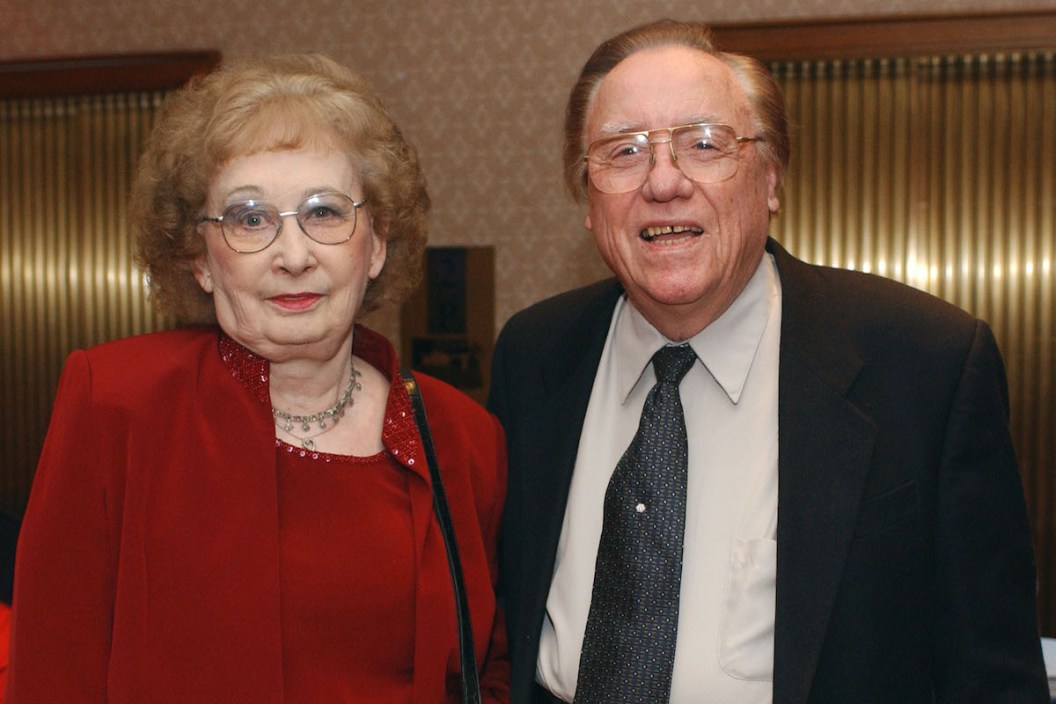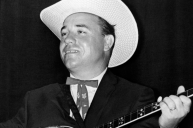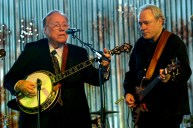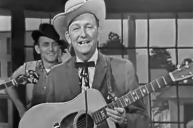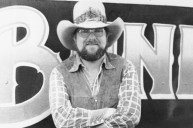[dropcap]L[/dropcap]ouise Scruggs spent over half a century guiding the career and exalting the brand of her husband, banjo innovator Earl Scruggs. As a manager, accountant and booking agent, first for Flatt & Scruggs and later for The Earl Scruggs Revue and other Scruggs family productions, she shattered barriers in popular music at large while often being the only woman in the room.
Videos by Wide Open Country
"She's considered one of the first managers in the music industry and Earl's career was very much a professionally-run business with her at the helm," Mary Beth Martin, executive director of the Earl Scruggs Center in Shelby, NC, told Wide Open Country. "When she began managing Flatt & Scruggs in 1955, she molded the example for the entire industry. In many ways, she was the key to the success of her musical family because she had an incredible understanding of popular music and trends in the industry."
The love story of Earl and the former Anne Louise Certain begins in the most idyllic way. Per author and journalist Thomas Goldsmith's Earl Scruggs and "Foggy Mountain Breakdown": The Making of an American Classic, Earl first spotted his future wife in the crowd at Nashville's Ryman Auditorium (the birthplace of bluegrass) during a Grand Ole Opry appearance by the genre's creator, Bill Monroe. Between 1945-1948, both Earl and future Flatt & Scruggs bandmate Lester Flatt played in Monroe's backing band, the Blue Grass Boys.
"Louise was the one that told that story for one of the CDs that Earl put out in later life," added Murphy Henry, a banjo picker and instructor and the author of Pretty Good for a Girl: Women in Bluegrass. "She wrote the liner notes, and that's where that story comes from. I think it's authentic that she saw this young man on stage and was really attracted to him."
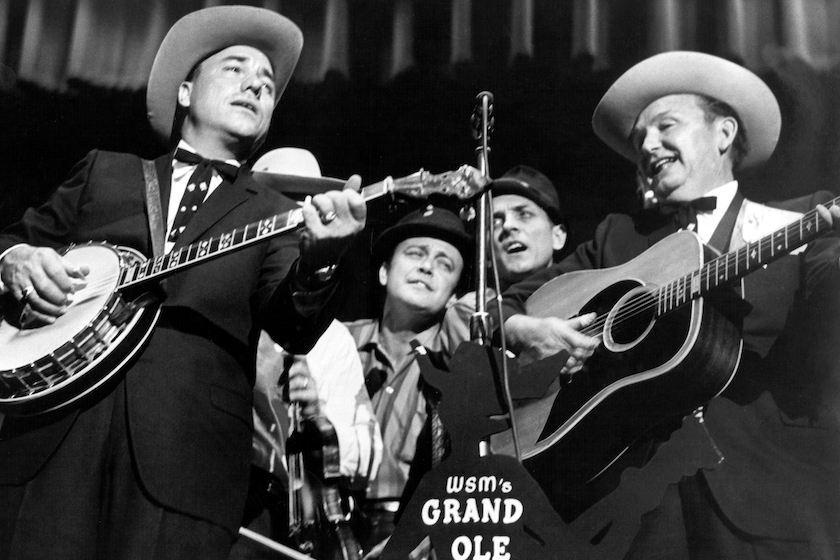
Lester Flatt (right) and Earl Scruggs (left) perform with The Foggy Mountain Boys at the Grand Ole Opry circa 1960 in Nashville. (Photo by Michael Ochs Archives/Getty Images)
Flatt & Scruggs formed in 1948, the same year Earl married Louise. By the mid-'50s, Louise assumed a pivotal role for the band.
"Originally, Earl was doing their booking and business management," said Carly Smith, marketing director of the Bluegrass Music Hall of Fame & Museum in Owensboro, Ky. "It was kind of a happenstance. He just asked her to call someone back, and she took care of it. She blossomed into that role of managing them. She had a business background and also in accounting, as well. She was doing their payroll and their accounting for the band. She was also renegotiating their contracts with their labels. She was doing it all, so to speak, most of all from a home office and managing her family at the same time."
"I do remember when I was talking to [Louise] one time about taking over the booking for Earl," Henry added. "When Earl was out on the road and was doing the booking, he often didn't have access to a pay telephone, which is what you would've had to use. So he would be calling Louise and asking her, 'will you take care of this because I can't quite get to it.' She started doing that just a little bit. She jokingly referred to it as 'my little hobby,' which I thought was interesting. It's a little bit like she was downplaying it or downplaying the start of it. But she found out that she had a knack for it."
The multiple duties Louise juggled fulfilled a childhood vow to get above her rural Tennessee raising.
"I got a little ol' toy typewriter and a desk when I was in first grade," she told the Tennessean in 2005. "Back in the Depression, when nobody had any money, all I wanted was a typewriter and a desk. I was going to move out of where I lived, get me a job in the city in an office. My mother worked her fingers to the bone and my daddy did, too, and I didn't want to go out in a field chopping corn."
Louise's business acumen led to such strategic moves for Flatt & Scruggs and its backing band, the Foggy Mountain Boys, as hiring artist Thomas B. Allen to paint instantly-recognizable album covers, recording the first live bluegrass album (Flatt & Scruggs at Carnegie Hall!) and, despite initial hesitation, embracing TV trendsetter The Beverly Hillbillies by contributing its theme song, country chart-topper "The Ballad of Jed Clampett."
"With The Beverly Hillbillies, at first she wasn't for their involvement in that just because there was a long, negative connotation of the hillbilly thing that she was trying to get away from," Smith explained. "Eventually, she saw it as a way that they could control their image. That obviously was a massive way to get the band to a new audience."
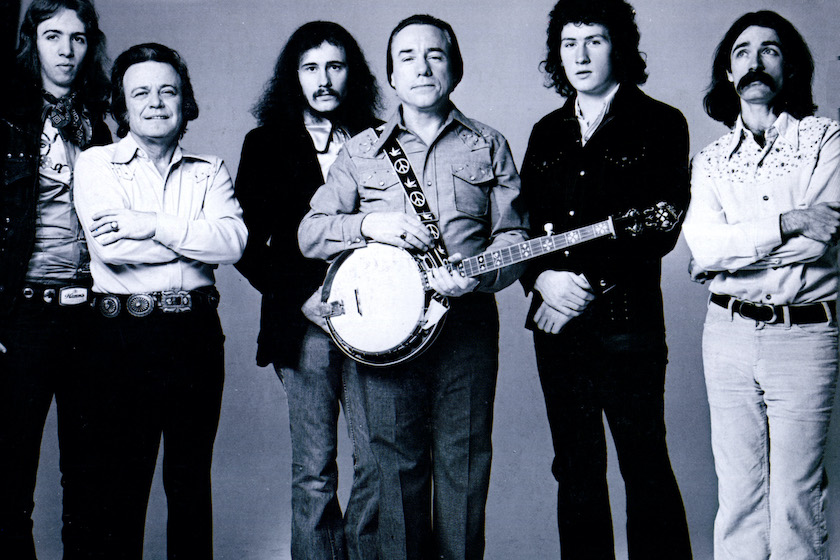
American musician Earl Scruggs (1924-2012) posed with members of the Earl Scruggs Revue in 1974. (Photo by GAB Archive/Redferns)
After Flatt & Scruggs parted ways in 1969, Louise guided the career of new band The Earl Scruggs Revue, which spotlighted the musical talents and tastes of the couple's three sons: Randy, Gary and Steve. The Revue pushed further into a hipper, younger scene embraced by Earl as early as his 1959 appearance at the inaugural Newport Folk Festival.
"Louise Scruggs astutely managed Earl's image and encouraged his interest in new music, leading to his part in the folk revival, the formation of The Earl Scruggs Revue— all of which solidified Earl's status as an American music legend for following generations," Martin added.
Until very late in her life, Louise consistently kept Earl's legacy in the public eye.
"Earl would make appearances for autograph sessions and different events and everything was directed through her-- she never stopped promoting Earl," said Andrea Roberts, founder and booker of the Andrea Roberts Agency as well as a veteran touring artist and an IBMA (International Bluegrass Music Association) board member. "Earl didn't just retire and ride off into the sunset and I believe that didn't happen because Louise was always thinking of ways for Earl to continue to perform and be recognized. Earl had amazing touring and recording achievements late in life and those were done under the watchful eye of Mrs. Louise."
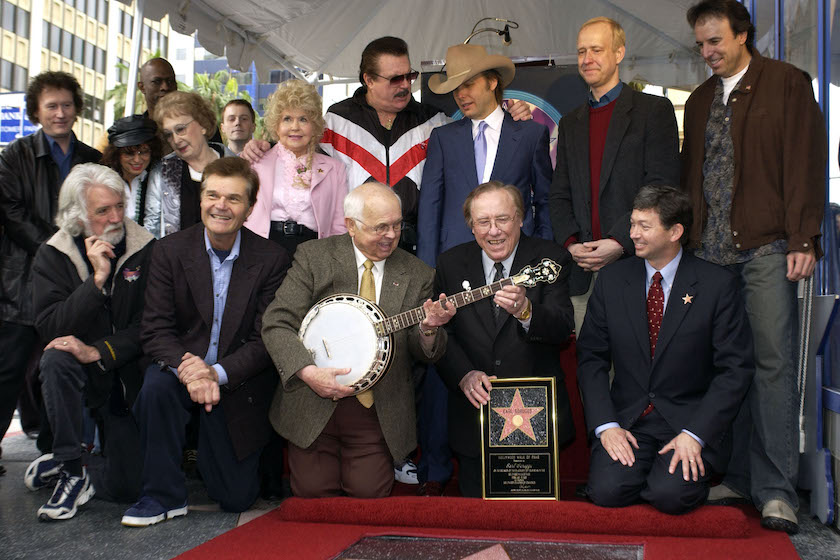
Fred Willard, Johnny Grant and Earl Scruggs during Earl Scruggs Honored with a Star on the Hollywood Walk of Fame for His Achievements in Music at Hollywood Boulevard in Hollywood, California, United States. (Photo by L. Cohen/WireImage)
Indeed, mainstream perceptions of bluegrass got directly shaped for 50-plus years by Scruggs Talent Agency, Inc.
"She advanced me and advanced our music," Earl told the Tennessean in 2005. "I didn't get where I went just on talent. What talent I had would never have peaked without her. She helped shape music up as a business, instead of just people picking and grinning."
Booking gigs and managing finances barely scratches the surface of Louise's contributions to the family business. For instance, Smith credits Flatt & Scruggs Music as the first publishing company founded by a woman.
"She set up even his fan club and mail order stuff," Smith added. "It was a full operation. She was an excellent writer. She wrote the liner notes, oftentimes uncredited, for their albums. She was doing a lot."
As for Louise's life outside of work, Goldsmith describes the Scruggs family's famed picking parties at their Nashville area home as crossing celebrity access (at one gathering, Goldsmith was introduced to Angelina Jolie and her partner at the time, Scruggs family friend Billy Bob Thornton) with Southern hospitality.
"They were big parties that were so welcoming," Goldsmith recalled. "You'd see Vince Gill and Travis Tritt and Buck White and John Jorgenson all standing there and playing mandolins, then you'd look over and see 50 people of whom you'd know none. They were probably just friends or family members. They'd retain a kind of country attitude about 'bring the kids and come on over. We'll cook out.' But I think Louise was somewhere between a really down-home kind of attitude and wanting to be part of this international scene."
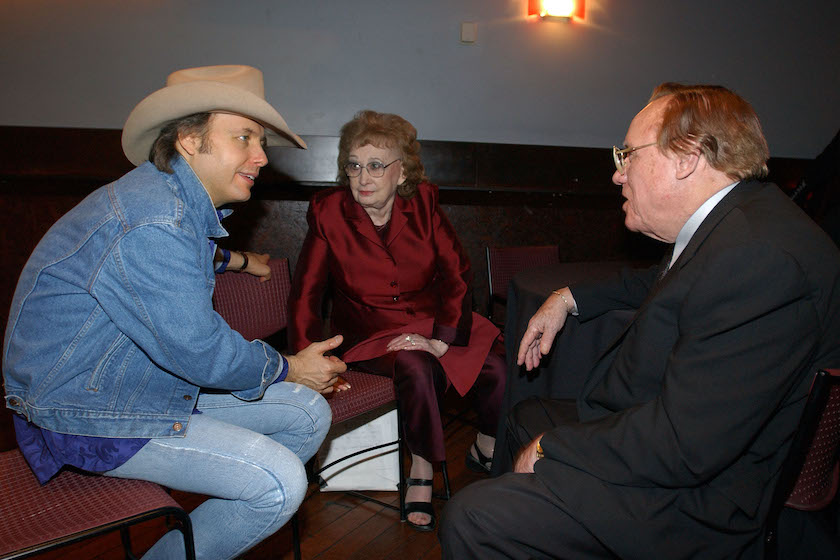
Musician/actor Dwight Yoakam (L) talks with bluegrass music legend Earl Scruggs (R) and Scruggs' wife Louise after a ceremony honoring Yoakam with a star on the Hollywood Walk of Fame June 5, 2003 in Hollywood. (Photo by Vince Bucci/Getty Images)
In the 15-plus years since her Feb. 2, 2006 death from respiratory disease complications, Louise has gotten more credit for a tireless work ethic and a fearless approach to navigating uncharted territory. Twenty-first century celebrations of Louise as an industry leader include the Country Music Hall of Fame and Museum's 2007 creation of the Louise Scruggs Memorial Forum Award (won in 2020 by Sugar Hill Records' Bev Paul) and her 2010 induction into the International Bluegrass Music Hall of Fame.
"I feel like Louise Scruggs has received the honor she was due posthumously because women in the music industry --especially women that were working in the business long before that was the norm-- are just recently really getting recognized for their achievements," Roberts said. "Louise was truly a one-of-a-kind businessperson that was able to make big things happen and that is why her career is being recognized now."
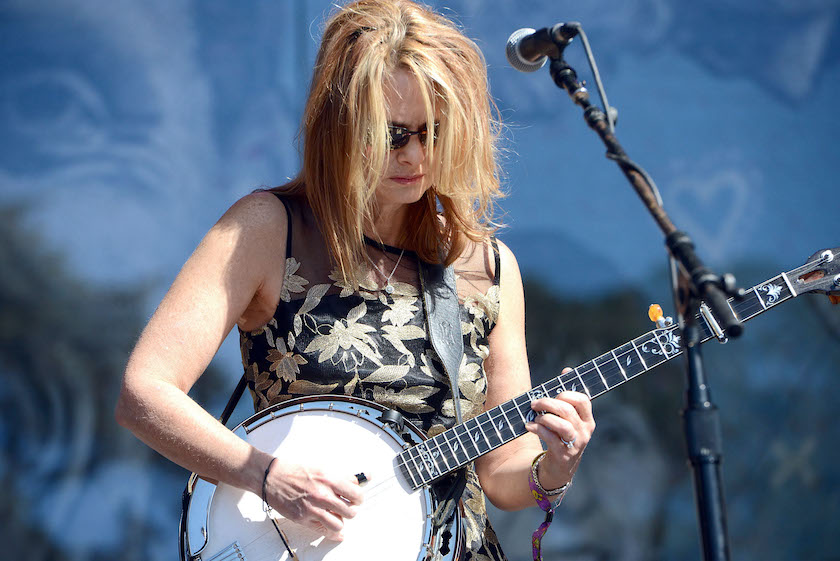
Musician Alison Brown performs onstage during the Hardly Strictly Bluegrass music festival at Golden Gate Park on October 7, 2017 in San Francisco, California. (Photo by Scott Dudelson/Getty Images)
Overall, Louise's life and legacy cleared a path followed by such peers as Alice Gerrard and Barbara Martin Stephens and by numerous women currently involved on the business end of bluegrass, country, folk and other genres.
"There's a lot of women on Music Row now [in Nashville]. There's enough that there's women on Music Row clubs. She would've been a club of one back then," explained Alison Brown, a Harvard-educated businessperson as well as a banjo picker, producer and co-founder of Compass Records. "That's crazy to think that it has grown from that place in 67 years to now where, you know, there's still conversations about where we're lacking in gender parity in the music business. Producing is one of those [roles] that's been really talked about. But we've definitely come a long way, and that's thanks to Louise and a lot of the people she inspired directly."
